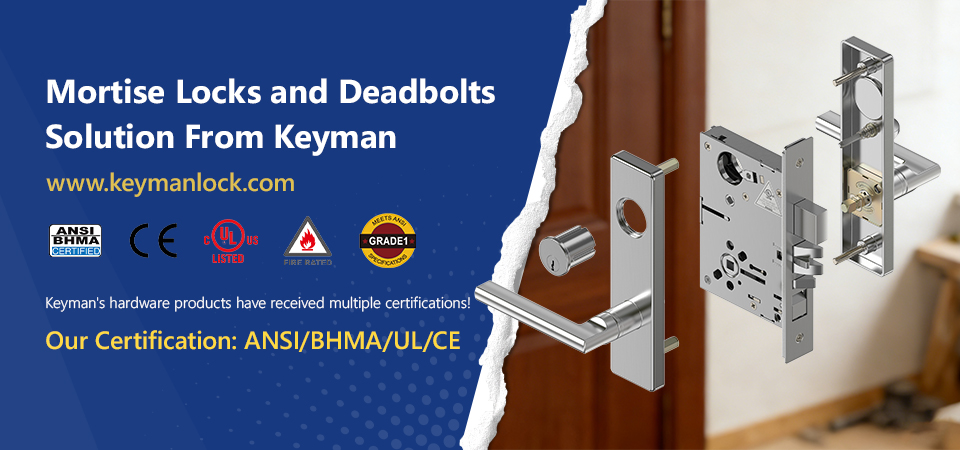Author: Site Editor Publish Time: 23-12-2024 Origin: Site












When it comes to securing your home, the lock on your door is the first line of defense. But with so many locking mechanisms available, how do you choose the best option? If you've narrowed your choices down to mortise locks and deadbolts, you're already on the right track. Both are excellent options, but each has unique strengths depending on your specific needs.
This guide compares mortise locks and deadbolts, breaking down their key features, differences, and which one is better suited for your door. By the end, you'll have a clearer understanding of what makes each lock type secure and how to pick the right one for your home or business.
Security is a top priority when evaluating any door lock, so how do mortise locks and deadbolts stack up? Let's take a deeper look.
A mortise lock is a heavy-duty lock that requires a pocket (or mortise) to be cut into the door to house the locking mechanism. This design integrates both the latch (used to hold the door closed when it's not locked) and a locking bolt (for enhanced security).
· Durability: Made from reinforced materials like brass or steel, mortise lock sets can withstand significant force, making them less susceptible to break-ins.
· Versatile locking systems: Many mortise locks include multiple cylinders, allowing for dual locking mechanisms (e.g., a key for each side).
· Commercial-grade use: Due to their design, they are commonly used for businesses, apartment complexes, and high-security areas requiring reliable locks.
A deadbolt, unlike a spring bolt, cannot be moved to the unlocked position except by rotating the lock cylinder with a key. It’s typically installed above the handle or latch and provides an additional layer of security.
· Single-point locking strength: Deadbolts extend directly into the doorframe, making it extremely difficult to force the door open.
· Simplicity: Their straightforward mechanism reduces the potential for lock-picking.
· Price point: Deadbolts are an affordable way to add security to homes while still being highly reliable.
· Winner for security: While both are strong, mortise locks usually edge out deadbolts because of their multi-point locking system and heavy-duty construction. However, for most residential doors, a high-quality deadbolt will provide sufficient security.
If you're exploring different lock types, it's helpful to understand the distinction between mortise locks and non-mortise locks. These fundamental differences impact the installation process, aesthetics, and effectiveness.
Requires modifications: Installing a mortise lock involves precision cutting a pocket into the door to fit the lock body, often requiring professional help.
Integrated design: A mortise lock set typically consists of a latch and a bolt within one mechanism, offering an all-in-one locking solution.
Luxurious aesthetic: Its flush design is more seamless, making it a favorite for those prioritizing style alongside security.
Easier installation:Non-mortise locks don’t require cutting into the door, making them more DIY-friendly and faster to install.
Separate handle and lock systems: Unlike mortise locks, non-mortise options often come as two separate mechanisms—a latch and a deadbolt placed independently of each other.
Less robust: While still secure, non-mortise locks are generally considered less durable and sophisticated compared to mortise locks.
Which to choose? If you're renovating or want a high-end, secure solution, mortise locks are worth the investment. On the other hand, non-mortise locks are ideal for quick installations and budget-friendly options.
Here’s a simplified breakdown of how mortise locks and deadbolts compare across various factors:
Feature | Mortise Lock | Deadbolt |
Installation | Requires professional fitting | Easier for DIY enthusiasts |
Design | Integrated lock and handle system | Installed separately from the door handle |
Durability | Heavy-duty, commercial-grade strength | High-quality deadbolts also durable |
Cost | More expensive due to complex build | Budget-friendly |
Security | Multiple locking points for added protection | Single-point locking system |
Use Case | Ideal for businesses & high-security areas | Perfect for residential doors |
Choosing between a mortise lock and a deadbolt ultimately depends on your door type, security needs, and budget.
· You need maximum security for a commercial or high-traffic area.
· A seamless, flush design is important to your door's aesthetic.
· You're comfortable investing more in installation and material costs.
· You need an affordable but reliable lock for a residential property.
· Supplemental security is required alongside an existing door handle or latch lock.
· You prefer a simpler installation process.
For best results, many homeowners and businesses pair a deadbolt with a mortise lock for a layered approach to security.
Professional installation is strongly recommended for mortise locks due to:
· Need for precise measurements and cutting
· Specialized tools requirement
· Complex multi-component assembly
· Critical alignment requirements
· Potential for door damage if installed incorrectly
Deadbolt installation is more straightforward:
· Standard hole saw requirements
· Basic tool needs
· Simple alignment process
· Lower risk of door damage
· DIY-friendly process
![]()

![]()
Regular maintenance for mortise locks includes:
· Annual lubrication of internal components
· Periodic checking of all screws and fasteners
· Professional servicing every few years
· Immediate attention to any sticking or binding
Deadbolts require simpler maintenance:
· Occasional lubrication
· Basic cleaning
· Tightening of loose screws
· Simple parts replacement when needed
Both mortise locks and deadbolts are excellent security solutions, each offering unique advantages depending on your needs. While mortise locks provide top-tier durability and multi-point security, deadbolts deliver high reliability at a lower cost, especially for residential use.
When you're deciding, think about the nature of the property you're securing, your budget, and the aesthetic you're aiming for. No one-size-fits-all answer exists, but either option will elevate your door's safety.
Want to explore stunning mortise lock sets or find the perfect deadbolt? Browse our curated selection of high-quality locks today and take the first step toward better security.
You can fill in the form below to ask us for more product information.